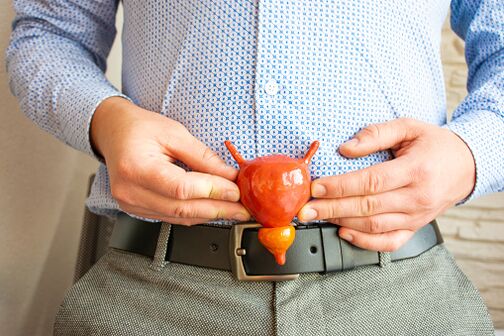Prostatitis is not the most pleasant disease, it tends to become a chronic disease. Any provocation from behavior, happiness, and symptoms will reappear: pain in the genital area, painful urination, and unstable erection.

The first prevention of prostatitis is a simple healthy lifestyle, without any special contraindications. The secondary prevention of disease onset is a number of measures, including diet, total refusal of alcohol, and of course appropriate medications.
What are the risk factors for disease?
Prostatitis can develop from a combination of two factors: the appearance of infection and the process of stagnation in the body.
The main sources of pathogens are:
- Intestinal diseases, such as Escherichia coli, Klebsiella, Proteus, etc. ;
- Sexual partners with infectious diseases of the genitourinary system: Chlamydia, Mycoplasma;
- Throat infection, untreated tooth decay, sore tonsils;
- Low physical activity.
All of these alone and as a whole may lead to the development of prostatitis.
Physical activity and prostatitis prevention
Low physical activity is the main cause of prostatitis in adults and young men. Prostatitis against the background of venous stasis of the pelvic organs is called congestive prostatitis.
If a man leads an active and healthy lifestyle, his pelvic area muscles will always be in good condition. They support the genitals well in the correct position and the whole system works well.
No time to go to the gym and special classes? This is not a problem! It's simple, but regular exercise and gymnastics are required every day. Exercise should be performed for at least 15-30 minutes, until sweat starts to protrude, that is, until there is slight physical activity.
Kegel exercise is suitable as a warm-up exercise to prevent prostatitis. However, it is worth knowing that if there are kidney stones, it cannot be done.Preventing prostatitis at home In addition, for the prevention of prostatitis, walking uphill briskly is also appropriate. Swimming and jogging are perfect.
With the correct seats, bicycles can also be used. It can promote blood circulation in the pelvic organs. Riding a 5-7 km bicycle 2-3 times a week can prevent prostatitis.
Regular sexual intercourse plays an important role in preventing prostatitis. Sexual relations should not be "for display", but should be in the context of desire and mutual satisfaction. A bad orgasm is not the way to keep the prostate in good condition. Arousal should be real and hormones should be orderly. Only in this way can prevention be 100% effective.
In addition, we should talk about the hygiene of sexual relations. This is also very important. Many partners who try to diversify their sexual intercourse simply forget basic hygiene. Unprotected sexual intercourse often becomes the cause of prostate infection and therefore develops into prostatitis.
Proper nutrition, regular and high-quality sex, no bad habits-all these together will lead to good male health and no prostate disease.
Products to prevent prostatitis
Proper nutrition and high-quality healthy food will help protect the body from harmful effects. Which foods are particularly helpful for preventing prostate? Here is just a small list:
- pumpkin seeds. On an empty stomach, you should eat 30-40 seeds for at least 7 consecutive days. It is useful to use them with honey or nuts;
- Fatty fish rich in omega-3, as well as seafood;
- Healthy herbs: parsley, lettuce, celery, basil;
- walnut.
Of course, nutrition plays an important role in preventing prostatitis and many other male health conditions.
Spicy dishes, beer in the evening, nuts and biscuits pickled with spices can only cause new symptoms of disease development. After eating the wrong food, symptoms of illness will appear immediately. Treatment must start from the very beginning.
Well, of course, don't forget to check up regularly. After 40 years, all men will need to see a urologist at least every six months. And women should see a gynecologist. At this age, the risk of prostatitis increases.




































